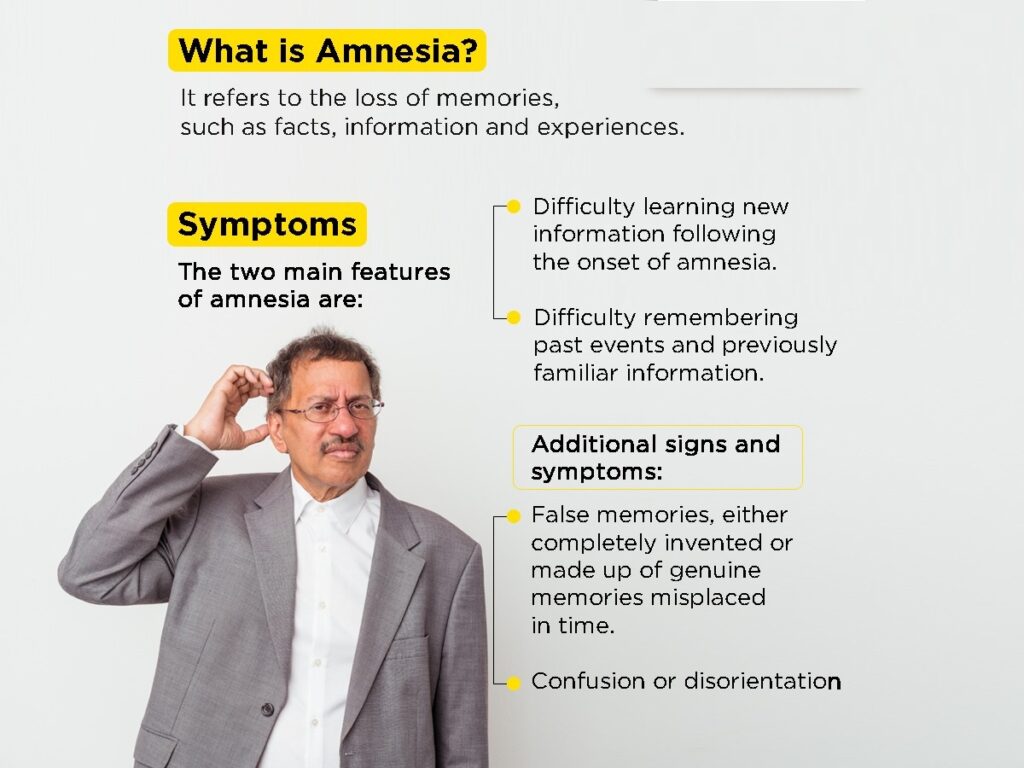What is Amnesia? Memory loss, which is commonly known as amnesia, can be a frightening and disorienting experience for those who suffer from it. It is characterized by a loss of ability to remember past events, people, or places. In severe cases, individuals may not even recognize their own loved ones or familiar surroundings.
Some common symptoms of memory loss include difficulty recalling recent events, confusion about time or place, and an inability to retain new information. This can be extremely distressing for both the individual experiencing the memory loss and their friends and family members.
Temporary amnesia can be caused by a variety of factors, including concussions, certain illnesses that result in high fevers, emotional stress, certain medications, and electroconvulsive therapy. In some cases, memory loss may also be a symptom of a more serious underlying condition, such as Alzheimer’s disease or other forms of dementia.
What is Amnesia?
It is important for individuals who are experiencing memory loss to seek medical attention in order to determine the underlying cause and receive appropriate treatment. In some cases, memory loss can be reversible with the right interventions.
In conclusion, memory loss is a complex and often distressing condition that can have a significant impact on an individual’s quality of life. By understanding the potential causes and seeking appropriate medical care, individuals can take steps to manage and potentially improve their memory loss.
Symptoms
The symptoms of amnesia depend on the cause, but generally include:
- Memory loss
- Confusion
- Inability to recognize familiar faces or places
- Difficulty recalling information
- Difficulty in learning new information
- Experiencing false memories or mixing up details of the events
- Impaired problem-solving or decision-making skills
- Emotional distress, frustration, or anxiety related to memory loss
- Repetitive questioning due to memory gaps
- Once the person recovers, they typically have no memory of their amnesia episode
The inability to remember prior events or information—a condition known as amnesia—leads to either partial or total memory loss. Confusion, disorientation, and trouble recalling recent events are among the symptoms. People could have trouble remembering familiar faces or locations, having trouble creating new memories, and asking the same questions over and over. These cognitive difficulties are frequently accompanied by emotional problems like worry and irritation.

Causes
Typical memory function involves many parts of the brain. Any disease or injury that affects the brain can affect memory.
Amnesia can result from damage to brain structures that form the limbic system, which controls emotions and memories. They include the thalamus found deep within the center of the brain. They also include the hippocampal formations found within the temporal lobes of the brain.
Amnesia caused by brain injury or damage is known as neurological amnesia. Possible causes of neurological amnesia include:
Concussion
Migraines
Hypoglycemia
Epilepsy
Electroconvulsive shock therapy
Drugs
Infection
Nutritional deficiency
Psychological
Lack of sleep
Amnesia, the loss of memory, can be caused by a variety of factors including brain injury, severe stress or trauma, illness, and substance abuse. Traumatic brain injuries, such as those from accidents or sports injuries, can damage areas of the brain critical for memory formation and retrieval.
Neurological conditions, notably Alzheimer’s disease and various forms of dementia, present a significant challenge as they progressively diminish memory functions over time. These disorders not only affect the individual’s ability to retain and recall information but can also impede cognitive processes that are crucial for daily functioning. Conversely, psychological factors such as experiencing severe emotional shock or constant high levels of stress can trigger a condition known as dissociative amnesia.
This type of amnesia can manifest differently in individuals, leading them to forget personal information that is essential for their identity and functionality. In contrast, the impact of substance abuse, including the misuse of drugs and alcohol, on memory function should not be overlooked. The deleterious effects of these substances on the brain can result in varying degrees of memory impairment, ranging from temporary lapses to permanent damage depending on the level and duration of substance abuse.
It’s increasingly vital to raise awareness about the diverse factors that influence memory and cognition, as the intricate interplay between neurological, psychological, and pharmacological elements can have profound and long-lasting implications on an individual’s cognitive health and overall well-being.
What does amnesia do to a person?
The majority of amnesia sufferers struggle with short-term memory, making it difficult for them to remember new knowledge. Most likely, recent memories are gone. Deeply rooted or farther-off memories might be spared. People might, for instance, remember childhood memories or be familiar with the names of former presidents.
Can you regain your memory after amnesia?
Because many conditions can cause amnesia, the treatments can vary widely, too. Many times, your brain can recover on its own, and you’ll regain your memory as it does. People with amnesia may not understand what’s happening to them.
Can stress cause amnesia?
Dissociative amnesia may occur as a result of chronic stress or trauma, as well as isolated, one-time experiences. This type of trauma can be brought on by the following: Being neglected or abused, whether it be physically, or emotionally, particularly as a child (though this can also happen to adults)
How to avoid amnesia?
1. Be physically active every day. Physical activity raises blood flow to the whole body, including the brain.
2. Stay mentally active.
3. Spend time with others.
4. Stay organized.
5. Sleep well.
6. Eat a healthy diet.
7. Manage chronic health problems.

